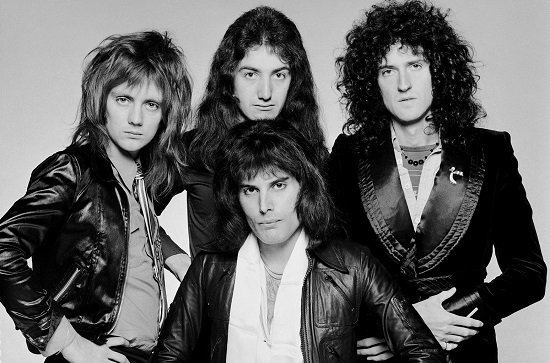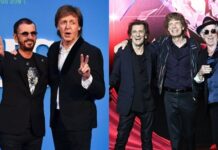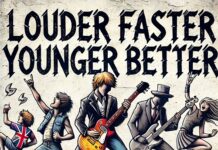Actor Rami Malek is the Academy Award-winning recipient in the Best Leading Actor category for his portrayal of Freddie Mercury in the Queen biopic Bohemian Rhapsody, which has now generated a global box-office gross over $750 million.
20th Century Fox Home Entertainment has already released a DVD, Blu-ray and 4K Ultra HD disc of Bohemian Rhapsody. It includes the full, uncut, never-before-seen Live Aid performance recreation coupled with the original footage. The DVD, Blu-ray and digital edition will also incorporate behind-the-scenes segments with the film’s cast along with Brian May and Roger Taylor discussing the making of the film.
I didn’t realize how many people have flocked to see Bohemian Rhapsody, and possess Queen-sanctioned video items, and constantly devour their audio catalog. I vastly underestimated the band’s devoted fan base and avid collectors. They’ve sold between 170 and 300 million records.
My frame game public and online profile have been more visible after being filmed along with Queen co-founders Brian May and Roger Taylor in their 2012 Queen at 40 documentary, directed by Matt O’Casey for BBC Television and issued and expanded as Queen: Days Of Our Lives: The Definitive Documentary of the World’s Greatest Rock Band as a 2014 DVD and Blu-Ray via Eagle Vision regularly broadcast on cable TV outlets.
I was merely a celluloid pundit reinforcing Queen’s legacy and became part of their visual, print and online documentation, a ramification of product participation.
I was subsequently quoted, describing Queen on Brian May’s website, “as American journalist Harvey Kubernik put it, ‘it wasn’t rock ‘n’ roll, it was Broadway.’”
Queen’s 1976 stage repertoire included an encore of Cy Coleman and Dorothy Fields’ song “Big Spender” initially done on the boards by Shirley MacLaine in the Broadway musical Sweet Charity. Mercury first heard Shirley Bassey’s 1967 version of the tune on BBC Radio and then by Liza Minnelli. “Big Spender” is on Queen’s Live At Wembley ’86.
I remember a 1977 Queen-centric incident in Southern California when then KROQ-FM deejay Rodney Bingenheimer, in his 1966 black Cadillac Fleetwood Brougham picked up Taylor and May at the Beverly Hilton Hotel and they schlepped out to the city of Fullerton in Orange County, to catch a show by the Runaways at a high school.
When the lads arrived, the head of campus security quickly spotted the loudly dressed long-hair trio walking on campus and immediately stopped them in their tracks demanding that they leave the premises.
Rodney then pleaded with the principal of the school. “We’re here to see the Runaways play. I’m with two members of Queen!”
He swiftly responded, “I don’t care if they are King!”
I saw Queen perform three times during the 1970s, and also interviewed Freddie Mercury twice — Once in Beverly Hills for the now defunct Melody Maker and then in London in 1975. Our conversation at the Beverly Hilton Hotel was a Special Melody Maker report Killer Queen Slay America!
Mercury regally waltzed into the room, stuck out his hands, and greeted me and fellow journalist Justin Pierce with: “Hello darlings. What do you think of my black finger nail polish?”
I quickly replied: “Freddie, I grew up in Hollywood. I know what kind of paint color real queens wear. So while in L.A. why don’t you go over to Ball Beauty on Fairfax Avenue. My cousin Shelia Kaye and Cher get their makeup supplies at that shop. It’s near Norty’s Music Center. Ask one of the girls at your Elektra Records label office on La Cienega Blvd to drive you there.”
Mercury poured a glass of champagne and requested us “to please put the tape machine on.” Freddie was a yenta and thoroughly enjoyed trumpeting Queen and discussing the machinations of their mid-70s career. We must have spent the first 10 minutes just talking about Liza Minnelli and Judy Garland.
I saw Judy sing in 1963 at her CBS-TV Judy Garland Show taping in Television City in a memorable duet with Barbra Streisand. In 1975, I sat next to Liza at a Rolling Stones concert. Freddie had seen Minnelli at the London Palladium in the very early 70s.
Mercury was stunned. “If you come to London, do call my publicist Tony. We must do this again.” And we did, but this time he was wearing green nail polish. He had an air of confidence and mega-stardom destiny about him. The boy had a keen sense of the pop music process and about being a star on and off the stage.
To tell you the truth, I was much more interested in talking to Freddie about the time when he, Taylor, and May cut versions of “I Can Hear Music” b/w “Goin’ Back” under the pseudonym Larry Lurex, than I was about discussing his sexuality. That session was around the time of the recording of Queen’s debut album (for legal reasons, they couldn’t call it a “Queen” single). Rodney Bingenheimer, who now hosts a show on SiriusXM, still spins “I Can Hear Music” by Larry Lurex on his Sunday shift.
I also had a delightful chat with Brian May after a Queen show at a party Elektra Records tossed in Hollywood. Brian informed me he saw the Jimi Hendrix Experience a few times. He recalled that in 1967 he was on the entertainment committee at Imperial College in London who booked the trio for a cheap rate. Before Queen and Smile, Brian was in a band called 1984 that opened a show for Hendrix or played at a venue with him.
In my last conversation with Russ Regan, the visionary A&R man and former record label executive at UNI/MCA and later 20th Century Records, he lamented one failure in the music business was not acquiring Queen in 1973 for a North American deal, losing out in a bidding war to Jac Holzman at Elektra. Regan gave the Beach Boys their name and at UNI, inked Elton John to the company and Barry White to 20th Century. “I loved Queen’s songwriting, harmonies and the sound I heard on the tape sent to me.”
So, I think it’s a perfect time after 44 years to write about Queen and Freddie Mercury again, utilizing my stateside 1976 interview with him, and reminding the world about this talented, charismatic performer and truly charming character.
1975 Interview With Freddie Mercury
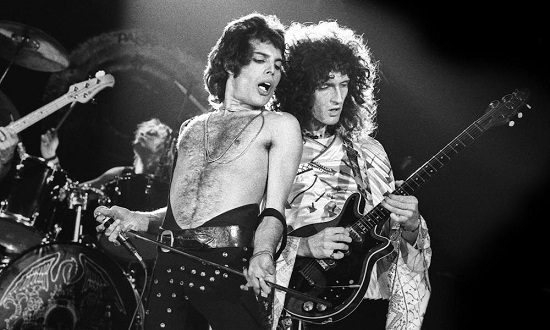
It was mid-afternoon in Beverly Hills as Freddie Mercury peered over the spacious swimming pool of the Hilton Hotel and reflected on Queen’s latest tour of the States.
“The tour has been going just great. The only drawback has been the problems with my voice, which I’ve been over-taxing. But since I’ve been taking care of it and resting more, it’s been fine. The problem is that when you do a tour, you try to schedule the concerts as close as possible.
“Therefore, it’s like a constant workout. However, at this moment, it’s raring to go and at the conclusion of this tour, we’re going to take a rest in Hawaii, which we really deserve. From there it’ll be on to Japan and Australia.”
The success story of Queen is remarkable when one considers the time in which they’ve become one of the world’s most popular bands. In Japan, they were recently voted one of the top three bands in the world, and that’s without even doing one date in there. What does Freddie see as being the key to their phenomenal following?
“I can’t pinpoint it, but there’s something about our music that’s different and unlike anybody else’s. I believe that’s our major strong point. But there’s other ingredients. Besides the fact that our timing has helped; there is the fact that we take risks. We’re not one of those groups that go through every stage, for we skipped a few hurdles and we’re willing to take the chances that brought us to our level of acceptance.
“This American tour is a perfect example. To undertake this kind of massive tour is not unheard of, but it is a risk. People were constantly telling us about the American economy and how the biggest groups are having trouble filling venues. And for us to come on as strong as we are, headlining after only half a previous tour, shows how confident we are, or what you can put across unless you were a headliner. And now we’ve proved we can do it. Here we are, the first time in L.A. and we’ve sold out two shows, and it’s simply an amazing feeling.”
That feeling is bound to be even greater on subsequent tours for Queen who are only now breaking into the American record charts with their single recording of “Killer Queen” from Sheer Heart Attack. The gentleness and buoyancy of the tune is in marked contrast to the high level of energy that characterizes their first two albums.
It is only on the third album that the diversity really became apparent. However, Mercury really doesn’t look at it as a great change.
“The thing I hate is trying to pinpoint everything for everybody. People always ask questions like, ‘Why did you write such and such a lyric and what does it mean? That’s now what it’s all about. The one thing the British press has been trying to do for years is to pinpoint and categorize. It really annoys us.
“We came out with ‘Keep Yourself Alive’ as a single, which is raunchy, and then we decided on ‘Killer Queen’ for a latter release. The first thing they do is go up to you and ask, ‘What are you up to?’ This is our music and it’s up to the individual to interpret it. It’s not up to us to come out with a product and label it. It would be boring if everything was laid out and everybody knew what it was all about all the time. I like people to make up their interpretation.
“They also want to categorize my stage image. I remember back in an interview where I said, ‘I play on the bisexual thing.’ Of course I play on it. It’s simply a matter of wherever my mood takes me. If people want to know and ask me if I’m gay, I tell them it’s up to themselves to find out. I’m just being my flamboyant self and having a good time,” he smiled.
Even though Mercury prefers not to try and analyze Queen’s music, he discussed their cumulative work in a logical manner: The first LP was very raw and full of freshness.
“It was simply a reflection of what we’d been doing for so long and we just wanted to get it out of our system. On the second album we found out that even though we had a formula, we didn’t necessarily have to keep it. Therefore, we dabbled at other things. Sheer Heart Attack was something different again. We wanted to make it interesting for ourselves as well as the listener. Hopefully, we succeeded on both counts. When we’re on stage we try to do the same thing.”
“We’re perfectionists. Although all of us write, it doesn’t necessarily mean that every song composed will appear on an album. Having all the members write adds to our versatility, and that’s another strong point. On the last album we wanted to create a certain feel, and did. However, there were so many ideas and things that we wanted to do and have yet to carry out.
“You simply can’t do everything on one album. Lots of groups eventually burn themselves out due to lack of new ideas. But at this point, there’s no way we’re going to burn out. In fact, presently we’re stronger than ever.
“We do rock ‘n’ roll, and our presentation is just a way of putting across the music. We view albums and concerts as two spheres of work. There’s a different level in the studio as compared to when you’re on stage. But when we’re before an audience, we let loose,” Freddie underscored.
Mercury and Queen were at the end of the US tour. It was interesting to know how he felt the English music market differs from the American.
“Even though singles may have been more important at one time in Britain, I feel that the stress on the singles and the albums is becoming pretty even. If you play too much on singles, you can quite easily become a singles group.
“At that point, it’s almost impossible to revert back to albums. I feel we’re in a fortunate position for we’ve only released four singles, including our new one. Therefore, we’ve achieved a balance. I think the same thing is true in America, though we’ve had to rely on response to our albums to carry us through. It wasn’t really till ‘Killer Queen’ that we received mass exposure on a commercial level.
“Back home, you have to be very careful of what you say or do because you’re in a position of immense responsibility. In fact, it can sometimes get ridiculous. We have this black-and-white theme that we carry out in England and it’s very strong. It has even got to the point where the audiences dress and look like me to a tee. They’re very faithful and it’s beautiful. On this tour, in Dallas, there was even a fan dressed with black makeup on one side of his face and white on the other, and it was marvelous.”
As for his own musical tastes, Mercury says: “I listen to all kinds of music, from Hendrix to Liza Minelli, all the way back to Mae West. I also enjoy Flo & Eddie when I hear them on the radio. They’re simply a riot. I also enjoy Joni Mitchell tremendously, and am constantly awed by her vocal phrasing as well as the amazing things she writes. She’s simply beautiful.”
Besides devoting the last few years to Queen, band members took time to record a single “I Can Hear Music” and “Goin’ Back” pressed up under the name Larry Lurex. I’d never associate Queen with Brill Building songwriters Jeff Barry, Ellie Greenwich, Phil Spector, Gerry Goffin and Carole King or expect cover versions of the Ronettes and the Byrds. I asked Freddie, how did this single come about?
“It was simply a by-product. We’d already completed our first album [at Trident Studios] and a producer friend [Robin Cable] told us about this record he wanted to put out just for fun. He said he wanted us to do it, but we told him he couldn’t use our name. Actually there were quite a number of studio musicians on it besides ourselves. It was in the days of Gary Glitter and Alvin Stardust.
“We never took it quite seriously since it didn’t have anything to do with Queen. It was only when we achieved popularity and people started figuring out that it was us that anybody was interested. It was just something rock stars dabble in once in a while and I was quite pleased with the outcome.”
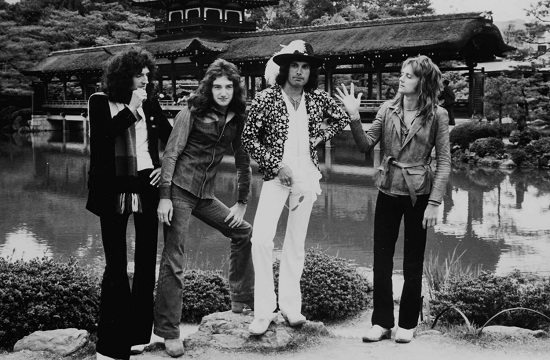
***
Harvey Kubernik is an author of 15 books. His literary and music anthology Inside Cave Hollywood: The Harvey Kubernik Music InnerViews and InterViews Collection Vol. 1, was published in December 2017, by Cave Hollywood. Kubernik’s The Doors Summer’s Gone was published by Other World Cottage Industries in February 2018.
In December 2018, Sterling/Barnes and Noble published Kubernik’s The Story of The Band From Big Pink to the Last Waltz.
This century Harvey penned the liner note booklets to the CD reissues of Carole King’s Tapestry, Elvis Presley’s The ’68 Comeback Special, The Ramones’ End of the Century and Allen Ginsberg’s Kaddish.
Kubernik’s writings have been printed in several book anthologies, including The Rolling Stone Book of the Beats and Drinking with Bukowski. He is the project coordinator of the recording set The Jack Kerouac Collection.
In November 2006, Harvey Kubernik was a featured speaker discussing audiotape preservation and archiving at special hearings called by The Library of Congress and held in Hollywood, California. Harvey literary and musical expeditions are displayed on Kubernik’s Korner at www.otherworldcottageindustries.com.


